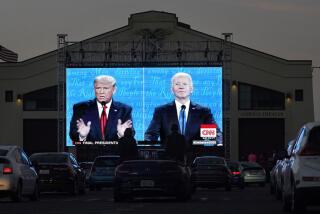Romney’s assault on Santorum focuses on earmarks, principles
- Share via
Reporting from Novi, Mich. — With momentum shifting his way, presidential contender Mitt Romney pushed Thursday for crucial primary wins using the formula that has kept him in the GOP hunt in good times and bad: an outsider’s posture enforced by unrelenting and overwhelming financial advantage.
Romney is blasting his chief rival, Rick Santorum, with a punishing ad drive in Michigan that mimics a similar, and successful, effort to demolish Newt Gingrich in last month’s Florida primary. The latest Romney attacks center around Santorum’s support for earmarked spending and portray the former Pennsylvania senator as a consummate Washington insider whose claim to be an unflinching, principled conservative doesn’t stand up to scrutiny.
Santorum inadvertently reinforced Romney’s strategy in Wednesday night’s debate when he failed to defend himself effectively on earmarks and admitted to having voted for programs he opposes, including federal funding for contraception.
Santorum said he had mistakenly done the expedient thing — siding with President George W. Bush, “the leader” of the Republican “team,” on the controversial No Child Left Behind law — instead of voting his conscience.
Rep. Ron Paul of Texas seized on the confession in a critique aimed directly at the anti-Washington creed of many conservative Republicans and followers of the tea party movement, Santorum’s base in the primaries.
Romney charged Thursday that Santorum’s explanations for why he voted in opposition to his principles showed that he was a creature of Washington who sided with special interests rather than the American people. Romney was campaigning in Arizona, which votes Tuesday along with Michigan.
“I don’t think I’ve ever seen a politician explain in so many ways why he voted against his principles,” said the former Massachusetts governor, whose own shifts of position, on abortion and other issues, are among his main vulnerabilities as a candidate. “My team is the American people, not the insiders of Washington, and I’ll fight for the people of America, not special interests.”
The closing ad push by the Romney forces, overwhelmingly negative in tone, echoed his lines of argument in the debate: that Santorum was steeped in the distasteful habits of Washington, a defender of insider gamesmanship who veered from the conservative line to confirm Sonia Sotomayor to the federal appeals bench and voted in favor of Alaska’s notorious “bridge to nowhere” and against the E-Verify system designed to curb illegal immigration.
“Is Rick Santorum ready to be president?” a male narrator asks in one ad, adopting a sinister tone. “He’s never run a business. Never run a state.”
Santorum’s allies, meantime, were airing an ad critical of Romney’s electoral prospects and a group backing President Obama was attacking Romney’s opposition to the federal bailout of the auto industry.
Post-debate analysis portrayed Wednesday’s nationally televised encounter as a win for Romney and, perhaps more important, a missed opportunity for Santorum, who failed to generate a breakout performance at a key juncture in the GOP race.
With no more debates in sight and Romney able to rely on his superior financial resources and organization, Santorum may find it difficult to overtake Romney in either Michigan or Arizona. The winner will gain fresh momentum heading into delegate contests in 14 states over the following week.
A recent Arizona poll for NBC by the Marist Institute for Public Opinion showed Romney leading Santorum by a comfortable 16 percentage points, largely on the strength of early voting. More than 200,000 such ballots have already been cast, many of them after Romney’s Florida victory on Jan. 31 but before Santorum’s mid-February surge. The poll showed Romney with a 30-percentage-point advantage over Santorum among early or absentee voters, who could cast as many as half the total primary votes.
In Michigan, where Romney was born and reared, the latest round of polling shows a virtual dead heat, a shift from the previous week, when Santorum appeared to be leading Romney by as much as 10 percentage points.
“All the polls show movement, and rather significant movement, toward Romney, and I don’t think Santorum did anything in the debate to change that and swing it back in his direction,” said Steve Mitchell, a Republican pollster in East Lansing, Mich., who is nonaligned in the presidential race.
Romney is credited with having a deeper organization throughout the state — Santorum has virtually none — as well as more money for advertising, targeted mail, phone calls and the support of almost the entire Republican establishment, from Gov. Rick Snyder down to the local level.
“If you knew nothing else about the race than that,” said Mitchell, “you’d say that candidate is going to win.”
Romney’s national and state campaigns appear increasingly bullish about his chances in Michigan, a state he had long been expected to carry, as he did four years ago, largely on the strength of his family ties. If he does win comfortably after trailing in the state for a time, the impact of the victory could be magnified.
One of Romney’s most prominent Michigan backers, Republican National Committee member Saul Anuzis, was already making that argument Thursday.
“I think Mitt Romney is in a strong position,” said the former state party chairman in a conference call arranged by Romney’s campaign. “I think we’ll pull off a big comeback victory here on Tuesday.”
Romney arrived in Michigan on Thursday evening to start his final push. Santorum was off the trail, his straitened circumstances forcing him to detour to Texas, which doesn’t vote for months, in search of badly needed fundraising.
Times staff writer Seema Mehta in Phoenix contributed to this report.
More to Read
Get the L.A. Times Politics newsletter
Deeply reported insights into legislation, politics and policy from Sacramento, Washington and beyond. In your inbox twice per week.
You may occasionally receive promotional content from the Los Angeles Times.










